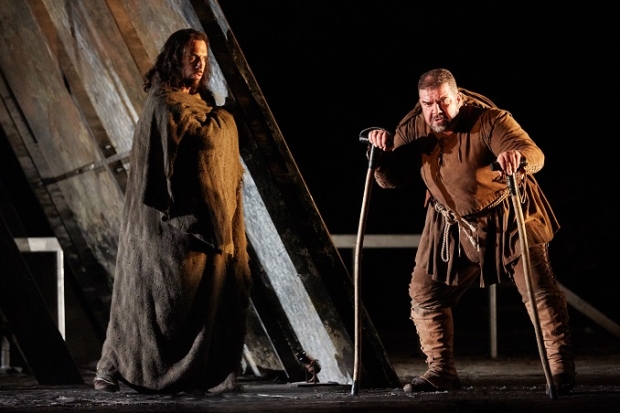Review: Rigoletto (Royal Opera House)

© Mark Douet
A litany of high-profile scandals and sackings in 2017 has triggered the start of an anti-permissive society, and a fresh awareness of human nature’s darker side is obliging us to recalibrate our moral values. In opera this has led to an unexpected side-effect: the need to view old work through altered eyes. Take the Royal Opera‘s Rigoletto. David McVicar‘s production of Verdi's opera was a Zeitgeist experience when it opened in 2001, but 16 years and umpteen revivals later its first-act excesses seem misjudged as well as tired.
The director’s determination to draw the audience into Mantua’s courtly sleaze now has the opposite effect, for today the writhing carnality and enforced coupling take the audience out of the experience as we think 'Are the actors cool with this?' 'Did they know what they were signing up to?'. Honourable as McVicar’s intentions are, or were, we have moved on. (It’s interesting to wonder why Damiano Michieletto’s inclusion of a rape scene in Guillaume Tell caused such a rumpus when this one returns unchallenged year after year.)
In any case I’ve always found the orgy sequence faintly amusing with its coy rationing of boobs (several) and willy (just the one). There have to be better ways to show that the Duke is a scoundrel. Verdi gives his tenor some glorious music to sing, all the better to seduce Gilda with, but the man’s a piece of work. This is something the American tenor Michael Fabiano brought out more than most of his predecessors in a brutally two-faced interpretation that rang true throughout. His voice is already weightier than it once was and he used its lack of brilliance to startling effect, turning his daunting tessitura in the lyrical duet "E il sol dell’anima" into something both seductive and dangerous.
'The opera buzzed'
If Fabiano’s high notes were heavy-duty, those of Sofia Fomina seemed helium-filled as her attractive, lightweight voice propelled Gilda to her doom. The Russian soprano’s timbre suited her character – Gilda is, after all, locked away like a caged bird until her guileless romance crashes her life – but it sat less happily in her duets with both the Duke and Rigoletto, her father. It’s a role that demands a shade more spinto power than she was able to provide.
Dimitri Platanias returns to the title role and is scheduled to sing it throughout this concentrated run of nine performances. Although the Greek baritone was a disappointment as Rigoletto during the 2012 revival, excellent subsequent appearances in Simon Boccanegra, Nabucco and Pagliacci made his return an attractive proposition. It was disappointing, then, to find him so apparently disengaged. Physically his use of the hunchback’s walking canes appeared to cost no effort at all – he might have been cross-county skiing – and vocally too he seemed content to slide through the score. Unusually, I was neither touched or outraged by him. Director of Opera Oliver Mears made a moving pre-performance tribute to the late Dmitri Hvorostovsky, himself once a brilliantly complex Rigoletto in this production, and the memory did not flatter Platanias.
Alexander Joel‘s curious conducting cannot have helped the singers: he alternated energised surges of tempo with grinding ritardandi into uncomfortable pauses. At least it was a characterful interpretation, however, and the opera buzzed. Fine work from Andrea Mastroni as Sparafucile and Nadia Krasteva as Maddalena, plus strong cameos in all the comprimario roles, kept the darkness visible. This matters because McVicar’s grim production, for all its faults, has the advantage that what we see aligns unusually well with what we hear.
Rigoletto runs in repertory at the Royal Opera House until 16 January.










